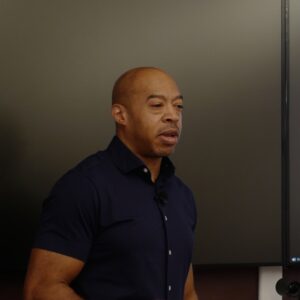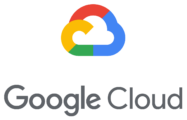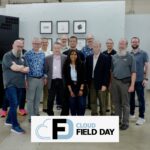|
|
 Bobby Allen Presents for Google Cloud at Cloud Field Day CFD20 |
This Presentation date is June 13, 2024 at 09:00-11:30.
Presenters: Bobby Allen, Jeff Welsch, Sean Derrington, William Denniss
Google Cloud Overview and Cloud Field Day Introduction
Watch on YouTube
Watch on Vimeo
In this presentation, Bobby Allen from Google Cloud provides an overview of the themes and topics to be discussed during their full-day session at Cloud Field Day 20. He begins by acknowledging the vast scope of Google Cloud, noting that this presentation focuses on foundational topics like storage, networking, and security, as well as the importance of AI in today’s tech landscape. Specifically, he discusses AI’s integration into the platform and its role in the software development lifecycle (SDLC). Throughout the presentation Allen introduces his “Bobby-isms” and frames the discussion with key considerations to ponder throughout the day.
Allen underscores that Google Cloud is not just another cloud provider but a platform that supports billions of users globally, requiring robust, planet-scale infrastructure. He introduces the concept of Google Distributed Cloud, which offers various solutions for those who can’t always use the public cloud due to regulatory or operational constraints. These solutions include software-only options, Google-connected hardware, and air-gapped solutions for environments with limited connectivity. He also mentions modernization tools like Migration Center and Migrate to Containers, which help transition legacy workloads to more modern architectures like containers and serverless computing.
Throughout the presentation, Allen emphasizes the importance of balancing new technologies with existing, proven solutions. He introduces the idea that AI is not an end in itself but a means to enhance other applications and use cases. Using the analogy of AI as a “sauce” that improves the “dish” (the core application), he stresses the need for practical, customer-focused solutions. Allen also differentiates between incremental improvements (Neos) and groundbreaking innovations (Kainos), urging a balanced approach to technology adoption.
Personnel: Bobby Allen
Running Enterprise Workloads in Google Cloud
Watch on YouTube
Watch on Vimeo
Jeff Welsch, product manager at Google Cloud, discusses the opportunity of running enterprise workloads in the cloud, emphasizing that enterprise use cases are substantial for many customers. He outlines Google’s compute organization, which includes offerings such as virtual machines, TPUs, GPUs, block storage, and enterprise solutions like VMware, SAP, and Microsoft. Welsch explains that Google Cloud is focused on optimizing infrastructure to meet customer requirements, especially in light of challenges like increasing compute demands from AI and the plateauing of Moore’s Law. Google Cloud’s approach involves leveraging AI capabilities and modern infrastructure to improve performance, reliability, security, and cost efficiency, while also prioritizing sustainability.
Welsch introduces Google’s Titanium technology, which aims to optimize infrastructure by breaking out of traditional server limitations and disaggregating performance capabilities. Titanium allows for tiered offloading, improving CPU responsiveness and storage performance, as exemplified by the HyperDisk service. He highlights that Titanium enables better optimization and efficiency, providing benefits like reduced latency and improved price performance without requiring customers to consume more resources. Additionally, Titanium supports dynamic resource management, allowing for live migration and non-disruptive maintenance, which enhances the overall reliability and performance of enterprise workloads.
The presentation also covers specific enterprise workloads like Microsoft, VMware, and SAP. Google Cloud offers robust support for Microsoft workloads, with features like cost optimization, live migration, and integration with AI-based modernization tools. For VMware, Google Cloud provides a seamless, integrated experience with the Google Cloud VMware Engine, facilitating easy migration and access to Google Cloud services. SAP workloads benefit from Google Cloud’s memory-optimized instances and tight integration with AI and machine learning capabilities. Welsch concludes by emphasizing Google Cloud’s commitment to optimizing infrastructure to meet the diverse needs of enterprise applications, ensuring performance, reliability, and cost-effectiveness.
Personnel: Jeff Welsch
Running Modern Workloads in Google Cloud
Watch on YouTube
Watch on Vimeo
William Denniss, product manager at Google, introduces GKE Autopilot during his presentation at Cloud Field Day 20. He explained that GKE Autopilot is a simplified way of using Google Kubernetes Engine (GKE) by focusing on Kubernetes as the primary interface, eliminating the need for users to manage the underlying infrastructure. Denniss emphasized that Kubernetes sits between traditional virtual machines (VMs) and fully managed services like Cloud Run, offering a balanced approach that provides flexibility without the complexity of managing low-level resources. He highlighted that Kubernetes is particularly beneficial for complex workloads, such as high-availability databases and AI training jobs, which require robust orchestration capabilities.
Denniss discussed the traditional challenges of managing Kubernetes, such as configuring node pools and handling security concerns. He explained that GKE Autopilot addresses these issues by collapsing the complex layers of infrastructure management into a more streamlined process. With Autopilot, users only need to interact with the Kubernetes API, while Google manages the underlying VMs and other infrastructure components. This approach reduces the administrative burden on users and allows them to focus on their workloads rather than the intricacies of infrastructure management. Denniss also mentioned that this model shifts the responsibility for infrastructure issues to Google, providing users with a more reliable and hands-off experience.
Discussing this solution with the delegates, Denniss concluded by emphasizing the importance of understanding the trade-offs between control and convenience, suggesting that while Autopilot may not be suitable for every use case, it offers significant benefits for those looking to simplify their Kubernetes management.
Personnel: William Denniss
AI/ML Storage Workloads in Google Cloud
Watch on YouTube
Watch on Vimeo
Sean Derrington from Google Cloud’s storage group presents advancements in cloud storage, particularly for AI and ML workloads. Google Cloud has focused on optimizing storage solutions to support the unique requirements of AI and ML applications, such as the need for high throughput and low latency. Key innovations include the Anywhere Cache, which allows data to be cached close to GPU and TPU resources to accelerate training processes, and the parallel file system, which is based on Intel DAOS and is designed to handle ultra-low latency and high throughput. These advancements aim to provide flexible and scalable storage options that can adapt to various workloads and performance needs.
Derrington also highlights the introduction of HyperDisk ML, a block storage offering that enables volumes of data to be accessible as read-only across thousands of hosts, further speeding up data loading for training. Furthermore, Google Cloud has introduced Cloud Storage FUSE with caching, which allows customers to mount a bucket as if it were a file system, reducing storage costs and improving training efficiency by eliminating the need for multiple data copies. These solutions are designed to decrease the time required for training epochs, thereby enhancing the overall efficiency of AI and ML workloads.
In addition to AI and ML optimizations, Google Cloud has focused on providing robust storage solutions for other workloads, such as GKE and enterprise applications. Filestore offers various instance types—Basic, Zonal, and Regional—each catering to different performance, capacity, and availability needs. Filestore Multi-Share allows for the provisioning of small persistent volumes, scaling automatically as needed. HyperDisk also introduces storage pools, enabling the pooling of IOPS and capacity across multiple volumes, thus optimizing resource usage and cost. These storage solutions are designed to support both stateless and stateful workloads, ensuring high availability and seamless failover capabilities.
Personnel: Sean Derrington









